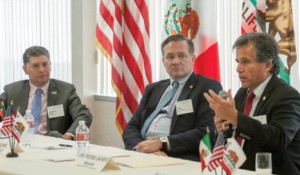![]()
Trade and investment opportunities in Mexico and California were the topic of discussion on May 5 at the California Chamber of Commerce International Luncheon Forum.
The forum was part of the VI California-Mexico Advocacy Day organized by Mexico’s Consulate General under the leadership of Gilberto Luna, acting consul general. The mission of the advocacy day was to increase the relevance of Mexico’s relationship with California by raising awareness of bilateral investment opportunities.
Speakers at the CalChamber luncheon forum touched on trade issues and answered questions from attendees.

Luncheon Speakers
Is North America Coming of Age as NAFTA Turns 21?

Dr. Pedro Javier Noyola, director general of Aklara and the NAFTA Fund, talked about how the North American Free Trade Agreement (NAFTA) has benefited Mexico.
Mexico used to be a really closed economy, Noyola explained. Twenty years ago, the trade to gross domestic product (GDP) ratio was about 20%; today it’s about 70%. “And the big jump was due to NAFTA,” he said.
In the last 20 years, two-way trade in goods between Mexico and the United States increased dramatically, from $81.4 billion in 1993 to $534.5 billion in 2014. Mexico has remained the United States’ second largest export market since 1995, with a total value of $240.3 billion in 2014. Top export categories from the U.S. to Mexico included computer and electronic products, transportation equipment, chemicals, and non-electrical machinery.
“You see a statistical effect of NAFTA really changing the path of openness,” Noyola said. “Exports, plus imports over GDP has tripled over the last 20 years. So Mexico has become open, and that’s very important because our tradable sector is disciplined by international prices.”
Noyola added there is “a ton of production sharing between the United States and Mexico.”
For an average U.S. import from Mexico, the total U.S.-produced content is 40%. By comparison, the U.S. content of Chinese imports is 4%.
In closing, Dr. Noyola touched on the Trans-Pacific Partnership Agreement and Transatlantic Trade and Investment Partnership. He said that NAFTA created a “huge competitive boost for its firms relative to the two other big regions of the world, and the challenge is to not erode that competitiveness as things are going on to the East and West.”
Increased Economic Integration

Dr. José Blanco, principal with Central Valley Fund Capital Partners, said that California and Mexico are becoming a “super regional economy,” with the combined GDPs amounting to $3.6 trillion.
“That’s like Germany, in terms of an economy,” Blanco explained. “We see those numbers becoming even more integrated.”
Looking at the level of trade dependencies, $25 billion for exports plus $41 billion for imports, equals $66 billion of commerce between Mexico and California. “That’s a very important economic engine,” Blanco said. “There are about 700,000 jobs in California that depend on that commerce.”
California trade with Mexico has grown 341% in the last 20 years and is expected to grow 7%–10% annually.
Central Valley agriculture also is an important source of commerce between the two regions, Blanco said. In 2014, California exported more than $664 million in agricultural products to Mexico.
Build on California-Mexico Relationship

The final speaker, Marcelo Sada, chief executive officer of Source Logistics, explained how his company got started using California as a platform and evolved.
“California and Mexico are profoundly integrated as partners rather than competitors in the global economy,” he said.
Mexican companies are investing and creating jobs across the United States, Sada explained, showing a map and noting that Mexican-owned companies operate more than 6,500 businesses in the U.S. In fact, the U.S. is the main destination for Mexican foreign direct investment (FDI), with Mexican companies investing more than $43 billion.
Drilling down to the state level, Mexican companies operate 735 business establishments in California and provide 13,296 jobs.
Sada said when he asked people what they thought of Mexico before, he got responses like, “cheap labor, unprepared labor and assembly.” Now, he said, people need to think of Mexico differently because the country is known for highly qualified labor and high tech production.
California-Mexico Cooperation
CalChamber Policy Advocate Marti Fisher also participated in an informational hearing about coordinating economic partnerships and fostering economic development with Mexico during a meeting of a Senate select committee chaired by Senator Ben Hueso (D-San Diego) on May 5.
Fisher reiterated the CalChamber’s longtime support for promoting trade and investment between California and Mexico and the assistance it provided in last July’s trade and investment mission.
Trading Partner Portal: Mexico
For more information, visit www.calchamber.com/Mexico.

